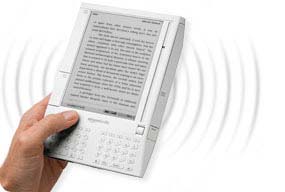Kindle 2 Reads Aloud, as Sci-Fi Predicted

Get the world’s most fascinating discoveries delivered straight to your inbox.
You are now subscribed
Your newsletter sign-up was successful
Want to add more newsletters?

Delivered Daily
Daily Newsletter
Sign up for the latest discoveries, groundbreaking research and fascinating breakthroughs that impact you and the wider world direct to your inbox.

Once a week
Life's Little Mysteries
Feed your curiosity with an exclusive mystery every week, solved with science and delivered direct to your inbox before it's seen anywhere else.

Once a week
How It Works
Sign up to our free science & technology newsletter for your weekly fix of fascinating articles, quick quizzes, amazing images, and more

Delivered daily
Space.com Newsletter
Breaking space news, the latest updates on rocket launches, skywatching events and more!

Once a month
Watch This Space
Sign up to our monthly entertainment newsletter to keep up with all our coverage of the latest sci-fi and space movies, tv shows, games and books.

Once a week
Night Sky This Week
Discover this week's must-see night sky events, moon phases, and stunning astrophotos. Sign up for our skywatching newsletter and explore the universe with us!
Join the club
Get full access to premium articles, exclusive features and a growing list of member rewards.
The latest version of Amazon's Kindle electronic book reader has a text-to-speech feature. The Kindle 2 can read a book or news out loud if you want; it uses a speech synthesizer to convert e-book text or a news article to spoken words. Science fiction writers, who have long predicted electronic books that talk, would say that it's about time.
How long ago did science fiction writers predict that people would prefer to have a machine read to them, rather than read the news themselves?
In his 1961 book Return from the Stars, Polish writer Stanislaw Lem wrote about what he called a lecton;
"The bookstore resembled, instead, an electronic laboratory. The books were crystals with recorded contents. They can be read the aid of an opton, which was similar to a book but had only one page between the covers. At a touch, successive pages of the text appeared on it.
"But optons were little used, the sales-robot told me. The public preferred lectons - lectons read out loud, they could be set to any voice, tempo, and modulation. Only scientific publications having a very limited distribution were still printed, on a plastic imitation paper." (Read more about the lecton)
In this short passage, Lem provides a very accurate description of both electronic books and e-book readers almost fifty years ago. Not a bad prediction!
However, in his 1959 short story War Game, Philip K. Dick wrote about an office memo that will read itself to you;
Get the world’s most fascinating discoveries delivered straight to your inbox.
"'Good morning,' the first memo said in its tinny, chattery voice, as Wiseman ran his thumb along the line of pasted tape." (Read more about the memo-voice)
Even earlier, in his 1934 novella The Lost Language, writer David H. Keller wrote about what he called a sound-transposing machine;
"'I have done it,'" he said simply, 'and you do not owe me a cent... In a month's time, tired people will be placing pages of a book in their machine and hear it read to them...'" (Read more about the sound-transposing machine)
Incredibly, the idea that a machine could read a book or a newspaper to you is more than a century old. In his 1899 story When the Sleeper Wakes, H.G. Wells wrote about what he called a babble machine;
"When I was a boy - I'm that old -- I used to read printed books. You'd hardly think it. Likely you've seen none -- they rot and dust so -- and the Sanitary Company burns them to make ashlarite. But they were convenient in their dirty way. Oh I learnt a lot. These new-fangled Babble Machines -- they don't seem new-fangled to you, eh? -- they're easy to hear, easy to forget...
"...in all the more comfortable private apartments of the city were fixed Babble Machines that would speak directly when a lever was pulled. The tenant of the apartment could connect this with the cables of any of the great News Syndicates that he preferred." (Read more about the babble machine)
It turns out that not everyone is pleased with the idea of a machine that can read out loud. Just last week, the Author's Guild insisted that the right to sell an audio version of a book is derivative under copyright law. You'd think with all of the prior art on the idea of a machine that would read printed matter, this would be a solved problem by now.
(This Science Fiction in the News story used with permission of Technovelgy.com)
 Live Science Plus
Live Science Plus










